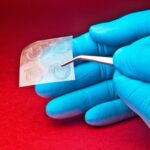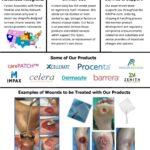CHRONIC WOUND CARE BY ANI

- Insurance Verification (IVR)
- Pre-Authorization
- Seamless Product Ordering
- Billing
- Multi-Stage Customer Support
What Are HCT/P’s?
HCT/Ps are biological products that are used to repair, replace or regenerate human tissues or organs, and can be derived from various sources, including human organs, tissues, cells or cell lines.
How Does FDA Regulate HCT/Ps?
The Food and Drug Administration (“FDA”) regulates and categorizes human cell and tissue products (“HCT/Ps”) based on the public health risks they pose. Low and medium risk products are regulated solely under Section 361 of the Public Health Service (“PHS”) Act and do not require FDA approval. Products regulated under Sec 361 are those which are:
- for homologous use
- minimally manipulated
- not combined with another article
- have no systemic use
Those that do not meet these criteria are considered high risk products regulated under the Food, Drug & Cosmetic Act. These drugs/biologics require either an Investigational New Drug (“IND”) Application and FDA approval or a biological license application (“BLA”) under Section 351 of the PHS Act.[1] Essentially, low and medium risk HCT/Ps are subject to certain regulations, but do not require the same level of FDA approval as higher risk products.
[1] FDA Guidance for Industry. Current Good Tissue Practice (CGTP) and Additional Requirement for Manufacturers of Human Cells, Tissues, and Cellular and Tissue-Based Products (HCT/P). CBER. Dec. 2011
Tissue and Tissue Product Q & A
Which cells or tissues are regulated by FDA?
FDA regulates human cells or tissues intended for implantation, transplantation, infusion, or transfer into a human recipient. These are referred to as human cells, tissue, and cellular and tissue-based products, or HCT/Ps, and are regulated under Title 21 Code of Federal Regulations (CFR), Parts 1270 and 1271. Certain HCT/Ps are also regulated under other parts of Title 21. Examples of HCT/Ps include bone, skin, corneas, ligaments, tendons, dura mater, heart valves, hematopoietic stem/progenitor cells derived from peripheral and cord blood, oocytes and semen. FDA does not regulate the transplantation of vascularized human organ transplants such as kidney, liver, heart, lung or pancreas. The Health Resources Services Administration (HRSA) oversees the transplantation of vascularized human organs.Does FDA regulate Organ donation?
No. The Health Resources and Services Administration oversees the donation and transplantation of vascular organs, such as hearts, kidneys, and livers.How safe is donated tissue?
The overall risk of disease transmission through tissue transplantation is believed to be very low. FDA has been working to help ensure the safety of human tissues since it first required donor testing in 1993. Beginning in 2001, certain establishments involved in manufacturing HCT/Ps were required to register and list their products with FDA. On May 25, 2005, the Current Good Tissue Practice rule requiring certain establishments to use methods and controls to prevent the transmission of communicable disease by HCT/Ps became effective. FDA's new requirements to determine donor eligibility, which also went into effect on May 25, 2005, include important steps to ensure that donors do not harbor infections that could be transmitted to recipients. These steps include reviewing the donor's medical history and other factors, physically assessing the donor, and testing for relevant communicable diseases that may place the donor at an increased risk of infections that could then unintentionally be transmitted to recipients through the tissues.What is the effective date of FDA's new regulations regarding donor eligibility and good tissue practices?
HCT/Ps recovered on or after May 25, 2005, are subject to the regulations in 21 CFR Part 1271.Under what regulations are tissues recovered before May 25, 2005 regulated?
Tissues recovered prior to May 25, 2005, are regulated under 21 CFR Part 1270.Why aren't all HCT/Ps licensed, approved, or cleared?
FDA's tissue regulation is a risk-based approach to cell and tissue regulation. Regulation focus on three general areas: 1) limiting the risk of transmission of communicable disease from donors to recipients; 2) establishing manufacturing practices that minimize the risk of contamination; 3) requiring an appropriate demonstration of safety and effectiveness for cells and tissues that present greater risks due to their processing or their use.
HCT/Ps that meet the criteria in Section 1271.10 are regulated solely under section 361 of the Public Health Service Act. These HCT/Ps must meet only the requirements in 21CFR Part 1271 and are not required to be licensed, approved or cleared. For HCT/Ps not meeting the criteria established in Section 1271.10, FDA premarket review (including a license, approval, or clearance) is required.Where I can I find a list of establishments that are registered with FDA?
You can search the database of FDA registered establishments (FDA - Find a Tissue Establishment).Where can I get information on stem cell research?
Stem cells can be found throughout the body. There are stem cells in tissues and organs as well as in umbilical cord blood and peripheral blood (i.e., hematopoietic stem cells). At this time there is no licensed stem cell treatment.
Additional resources regarding stem cell research are available from the National Institutes of Health resource for stem cell research. If you are interested in clinical trials using stem cell therapies, you may want to visit http://www.clinicaltrials.gov. This site provides regularly updated information about federally and privately supported clinical research in human volunteers. ClinicalTrials.gov provides information about a trial's purpose, who may participate, locations, and phone numbers for more details. The information provided on ClinicalTrials.gov should be used in conjunction with advice from health care professionals.






